- Home
- James Clavell
Whirlwind Page 35
Whirlwind Read online
Page 35
“Bombs away! Let’s go!” Pietro ordered, his teeth chattering from the cold, and buckled himself in again. At once the chopper peeled off and he was so relieved that it was done, he started to laugh. Hysterically the others joined him and all happily turned to watch below as he began to countdown: “…six…five…four…three…two…one!” Nothing happened. As quickly as their laughter had arrived, it vanished. “Did you see it fall, Jean-Luc?”
“No. No, we saw nothing,” the Frenchman replied gloomily, not wanting to repeat the maneuver. “Perhaps it hit a rock and the fuse got knocked away.” But inside he was saying to himself, Stupid Italian anus eater, can’t even fix a few sticks of dynamite to a fornicating fuse. “We will do it again, yes?”
“Why not?” Pietro said confidently. “The detonator was perfect. That it did not fire was an Act of the Devil. Yes, without a doubt—it happens many times in snow. Many times. Snow is a whore and you can nev—”
“Don’t blame the snow, Pietro, and it was an Act of God, not of the Devil,” Gianni said superstitiously, crossing himself. “By my mother, enough of the Devil while we’re aloft.”
Pietro took out the second charge and examined it carefully. The wire holding the sticks tight was firm and the fuse firm. “There, you see, perfect, just like the other.” He tossed it from one hand to the other then banged it hard on his armrest to see if the fuse would dislodge.
“Mamma mia,” one of the men said, his stomach turning over. “Are you mad?”
“This’s not like nitro, amico,” Pietro told him and banged it even harder. “There, you see it’s tight.”
“It’s not as tight as my anus,” Gianni said angrily in Italian. “Stop it for the love of the Mother of God!”
Pietro shrugged and looked out of the window. The crest was approaching now. He could see the exact spot. “Get ready, Gianni.” Then into the boom mike, “Just a little more, Signor Pilot, more to the east. Hold her there…steady her…can’t you keep her steadier? Get ready, Gianni.” He held up the fuse, the lighter near to the end. “Open the fornicating door!”
Irritably, Gianni unlocked his seat belt and obeyed, the airplane twisted and he cried out, lost his footing, his weight went against the door, opening it wider, and he pitched out. But the man was holding his belt and he held Gianni there on the brink, half in, half out of the doorway, the wind suction tearing at them. The instant Gianni had opened the door, Pietro had thumbed the lighter and the fuse had caught but in the momentary panic over Gianni, Pietro was distracted. Instinctively he, too, had grabbed for Gianni and the dynamite was knocked out of his hand. They all watched appalled as he scrambled on the floor, reaching under the seats for it as it rolled this way and that, the fuse burning merrily—his headset torn off. Almost fainting with fear, Gianni got one hand firmly on the doorjamb and began to drag himself back, petrified that his belt would give way and cursing himself that he had worn this thin one that his wife had given him for Christmas…
Pietro’s fingers touched the dynamite. The fuse spluttered against his flesh, burning him, but he did not feel the pain. He got a firm grip then, still on the floor, squirmed around, hung on to a chair support and threw the dynamite and what was left of the fuse past Gianni overboard, then reached forward with his free hand and grabbed one of his friend’s legs, helping to drag him back. The other man slammed the door closed and the two of them, Pietro and Gianni, collapsed on the floor.
“Take her away, Scot,” Jean-Luc said weakly.
The chopper banked and left the north face two hundred feet below. For a moment the crest was pure and stark and motionless. There was a vast explosion that no one in the chopper felt or heard. Snow spiraled upward and began to settle. Then with a mighty roar, the whole of the north face tumbled away, the avalanche fell into the valley, searing the mountainside with a swath a quarter of a mile wide until it had ceased.
The chopper came around. “My God, look!” Scot said, pointing ahead. The overhang had vanished. Above the Bellissima rig was only a gentle slope, the site untouched except where the trailer and the single mud tank had already been carried away by the first avalanche.
“Pietro!” Jean-Luc called out excitedly. “You’ve…” He stopped. Pietro and Gianni were still on the floor collecting themselves, Pietro’s headset vanished. “Scot, they won’t be able to see from their windows—go closer and turn so they can see!”
Excitedly, Jean-Luc climbed back into the cabin and began to pummel Pietro, congratulating him. Blankly everyone stared at him and when they understood what he was shouting over the screech of the engines, they forgot their fears and peered out of the windows. And when they saw how perfectly the explosion had cleaned away the danger, they let out a cheer. Gianni embraced Pietro emotionally, swearing eternal friendship, blessing him for saving him, for saving their lives and saving their jobs.
“Niente, caro,” Pietro said expansively. “Am I not a man of Aosta?”
Jean-Luc stood over the stretcher and gently shook Mario Guineppa. “Mario! Pietro did it—he did it perfectly. Bellissima’s safe…”
Guineppa did not answer. He was already dead.
TUESDAY
February 13
ON THE NORTH FACE OF MOUNT SABALAN: 10:00 A.M. The night was bitterly cold under a cloudless sky, stars abundant, the moon strong and Captain Ross and his two Gurkhas were working their way cautiously under a crest following the guide and the CIA man. The soldiers wore cowled, white snow coveralls over their battle dress, and gloves and thermal underwear, but still the cold tormented them. They were about eight thousand feet, downwind of their target half a mile away the other side of the ridge. Above them the vast cone shape of the extinct volcano soared over sixteen thousand.
“Meshgi, we’ll stop and rest,” the CIA man said in Turkish to the guide. Both were dressed in rough tribesmen’s clothes.
“If you wish it, Agha, then let it be so.” The guide led the way off the path, through the snow, to a small cave that none of them had noticed. He was old and gnarled like an ancient olive tree, hairy and thin, his clothes ragged, and still the strongest of them after almost two days’ climbing.
“Good,” the CIA man said. Then to Ross, “Let’s hole up here till we’re ready.”
Ross unslung his carbine, sat, and rested his pack gratefully, his calves and thighs and back aching. “I’m all one big bloody ache,” he said disgustedly, “and I’m supposed to be fit.”
“You’re fit, sahib,” the Gurkha sergeant called Tenzing said with a beam. “On our next leave we go up Everest, eh?”
“Not on your Nelly,” Ross said in English and the three soldiers laughed together.
Then the CIA man said thoughtfully, “Must be something to stand on top of that mother.”
Ross saw him look out at the night and the thousands of feet of mountain below. When they had first met at the rendezvous near Bandar-e Pahlavi two days ago, if he hadn’t been told otherwise he would have thought him part Mongol or Nepalese or Tibetan, for the CIA man was dark-haired with a yellowish skin and Asian eyes and dressed like a nomad.
“Your CIA contact’s Rosemont, Vien Rosemont, he’s half Vietnamese-half American,” the CIA colonel had said at his briefing. “He’s twenty-six, been here a year, speaks Farsi and Turkish, he’s second-generation CIA, and you can trust him with your life.”
“It seems I’m going to have to, sir, one way or another, don’t you think?”
“Huh? Oh, sure, yes. Yes, I guess so. You meet him just south of Bandar-e Pahlavi at those coordinates and he’ll have the boat. You’ll hug the coast until you’re just south of the Soviet border, then backpack in.”
“He’s the guide?”
“No. He, er, he just knows about Mecca—that’s our code name for the radar post. Getting the guide’s his problem—but he’ll deliver. If he’s not at the rendezvous, wait through Saturday night. If he’s not there by dawn, he’s blown and you abort. Okay?”
“Yes. What about the rumors of insurrection in Azer
baijan?”
“Far as we know there’s some fighting in Tabriz and the western part—nothing around Ardabil. Rosemont should know more. We, er, we know the Soviets are massed and ready to move in if the Azerbaijanis throw Bakhtiar supporters out. Depends on their leaders. One of them’s Abdollah Khan. If you run into trouble go see him. He’s one of ours—loyal.”
“All right. And this pilot, Charles Pettikin. Say he won’t take us?”
“Make him. One way or another. There’s approval way up to the top for this op, both from your guys and ours, but we can’t put anything into writing. Right, Bob?”
The other man at the briefing, a Robert Armstrong whom he had also never met before, had nodded agreement. “Yes.”
“And the Iranians? They’ve approved it?”
“It’s a matter of, er, of national security—yours and ours. Theirs too but they’re…they’re busy. Bakhtiar’s, well, he’s—he may not last.”
“Then it’s true—the U.S. are jerking the rug?”
“I wouldn’t know about that, Captain.”
“One last question: why aren’t you sending your fellows?”
Robert Armstrong had answered for the colonel. “They’re all busy—we can’t get any more here quickly—not with your elite training.”
We’re certainly well trained, Ross thought, easing his shoulders cut raw by his backpack straps—to climb, to jump, to ski, to snorkel, to kill silently or noisily, to move like the wind against terrorist or public enemy, and to blow everything sky-high if need be, above or under water. But I’m bloody lucky, I’ve everything I want: health, university, Sandhurst, paratroopers, Special Air Services, and even my beloved Gurkhas. He beamed at both of them and said a Gurkhali obscenity in a vulgar dialect that sent them into silent fits of laughter. Then he saw Vien Rosemont and the guide looking at him. “Your pardon, Excellencies,” he said in Farsi. “I was just telling my brothers to behave themselves.”
Meshgi said nothing, just turned his attention back to the night.
Rosemont had pulled off his boots and was massaging the chill out of his feet. “The guys I’ve seen, British officers, they’re not Mends with their soldiers, not like you.”
“Perhaps I’m luckier than others.” With the sides of his eyes Ross was watching the guide who had got up and was now standing at the mouth of the cave, listening. The old man had become increasingly edgy in the last few hours. How far do I trust him? he thought, then glanced at Gueng who was nearest. Instantly the little man got the message, nodded back imperceptibly.
“The captain is one of us, sir,” Tenzing was saying to Rosemont proudly. “Like his father and grandfather before him—and they were both Sheng’khan.”
“What’s that?”
“It’s a Gurkhali title,” Ross said, hiding his pride. “It means Lord of the Mountain. Doesn’t mean much outside the Regiment.”
“Three generations in the same outfit. That’s usual?”
Of course it’s not usual, Ross wanted to say, disliking personal questions, though liking Vien Rosemont personally. The boat had been on time, the voyage up the coast safe and quick, them hidden under sacking. Easily ashore at dusk and on their way to the next rendezvous where the guide had been waiting, fast into the foothills, and into the mountains, Rosemont never complaining but pressing forward hard, with little conversation and none of the barrage of questions he had expected.
Rosemont waited patiently, noticing Ross was distracted. Then he saw the guide move out of the cave, hesitate, then come back and squat against the cave mouth, rifle cradled on his lap.
“What is it, Meshgi?” Rosemont asked.
“Nothing, Agha. There are flocks in the valley, goats and sheep.”
“Good.” Rosemont leaned back comfortably. Lucky to find the cave, he thought, it’s a good place to hole up in. He glanced back at Ross, saw him looking at him. After a pause he added, “It’s great to be part of a team.”
“What’s the plan from now on?” Ross asked.
“When we get to the entrance of the cave, I’ll lead. You and your guys stay back until I make sure, okay?”
“Just as you like, but take Sergeant Tenzing with you. He can protect your tail—I’ll cover you both with Gueng.”
After a pause, Rosemont nodded. “Sure, sounds good. Okay, Sergeant?”
“Yes, sahib. Please tell me what you want simply. My English is not good.”
“It’s just fine,” Rosemont said, covering his nervousness. He knew Ross was weighing him like he was weighing them—too much at stake.
“You just blow Mecca to hell,” his director had told him. “We’ve a specialist team to help you; we don’t know how good they are but they’re the goddamn best we can get. Leader’s a captain, John Ross, here’s his photo and he’ll have a couple of Gurkhas with him, don’t know if they speak English but they come recommended. He’s a career officer. Listen, as you’ve never worked close with Limeys before, a word of warning. Don’t get personal or friendly or use first names too fast—they’re as sensitive as a cat with a feather up its ass about personal questions, so take it easy, okay?”
“Sure.”
“Far as we know you’ll find Mecca empty. Our other posts nearer Turkey are still operating. We figure to stay as long as we can—by that time the brass’ll make a deal with the new jokers, Bakhtiar or Khomeini. But Mecca—goddamn those bastards who’ve put us at so much risk.”
“How much risk?”
“We think they just left in a hurry and destroyed nothing. You’ve been there, for crissake! Mecca’s stuffed with enough top secret gizmos, listening gear, seeing gear, long-range radar, locked in satellite ciphers and codes and computers to get our unfriendly KGB chief Andropov voted Man of the Year—if he gets them. Can you believe it—those bastards just hightailed it out!”
“Treason?”
“Doubt it. Just plain stupid, dumb—there wasn’t even a contingency plan at Sabalan, for crissake—anywhere else either. Not all their fault, I guess. None of us figured the Shah’d fold so goddamn quick, or that Khomeini’d get Bakhtiar by the balls so fast. We got no warning—not even from SAVAK…”
And now we have to pick up the pieces, Vien thought. Or, more correctly, blow them to hell. He glanced at his watch, feeling very tired. He gauged the night and the moon. Better give it another half an hour. His legs ached, and his head. He saw Ross watching him and he smiled inside: I won’t fail, Limey. But will you?
“An hour, then we’ll move out,” Vien said.
“Why wait?”
“The moon’ll be better for us. It’s safe here and we’ve time. You’re clear what we do?”
“Mine everything in Mecca you mark, blow it and the cave entrance simultaneously, and run like the clappers all the way home.”
Rosemont smiled and felt better. “Where’s home for you?”
“I don’t know really,” Ross said caught unawares. He had never asked himself the question. After a moment, more for himself than the American, he added, “Perhaps Scotland—perhaps Nepal. My father and mother’re in Katmandu, they’re as Scots as I am but they’ve been living there off and on since ’51 when he retired. I was even born there though I did almost all my schooling in Scotland.” Both’re home, for me, he thought. “What about you?”
“Washington, D.C.—really, Falls Church, Virginia, which is almost part of Washington. I was born there.” Rosemont wanted a cigarette but he knew it might be dangerous. “Pa was CIA. He’s dead now but he was at Langley for the last few years, which’s close by—CIA HQ’s at Langley.” He was happy to be talking. “Ma’s still in Falls Church, haven’t been back in a couple of years. You ever been to the States?”
“No, not yet.” The wind had picked up a little and they both studied the night for a moment.
“It’ll die down after midnight,” Rosemont said confidently.
Ross saw the guide shift position again. Is he going to make a run for it? “You’ve worked with the guide before?”
&nb
sp; “Sure. I tramped all over the mountains with him last year—I spent a month here. Routine. Lotta the opposition infiltrate through this area and we try to keep tabs on ’em—like they do us.” Rosemont watched the guide. “Meshgi’s a good joe. Kurds don’t like Iranians, or Iraqis or our friends across the border. But you’re right to ask.”
Ross switched to Gurkhali. “Tenzing, watch everywhere and the pathfinder—you eat later.” At once Tenzing slipped out of his pack and was gone into the night. “I sent him on guard.”
“Good,” Rosemont said. He had watched them all very carefully on the climb up and was very impressed with the way they worked as a team, leap-frogging, always one of them flanking, always seeming to know what to do, no orders, always safety catches off. “Isn’t that kinda dangerous?” he had said early on.
“Yes, Mr. Rosemont—if you don’t know what you’re doing,” the Britisher had said to him with no arrogance that he could detect. “But when every tree or corner or rock could hide hostiles, the difference between safety on and off could mean killing or being killed.”
Vien Rosemont remembered how the other had added guilelessly, “We’ll do everything we can to support you and get you out,” and he wondered again if they would get in, let alone out. It was almost a week since Mecca had been abandoned. No one knew what to expect when they got there—it could be intact, already stripped, or even occupied. “You know this whole op’s crazy?”
“Ours not to reason why.”
“Ours but to do or die? I think that’s the shits!”
“I think that’s the shits too if it’s any help.”
It was the first time they had laughed together. Rosemont felt much better. “Listen, haven’t said it before, but I’m happy you three’re aboard.”

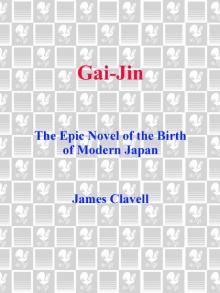 Gai-Jin
Gai-Jin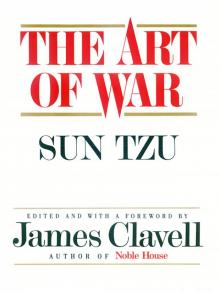 The Art of War
The Art of War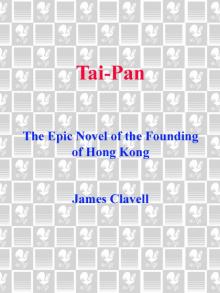 Tai-Pan
Tai-Pan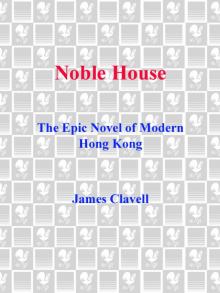 Noble House
Noble House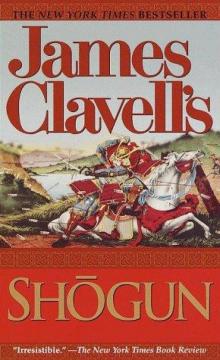 Shōgun
Shōgun Whirlwind
Whirlwind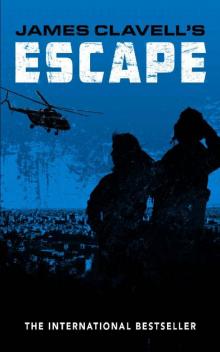 Escape
Escape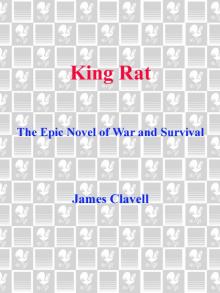 King Rat
King Rat The Children's Story
The Children's Story